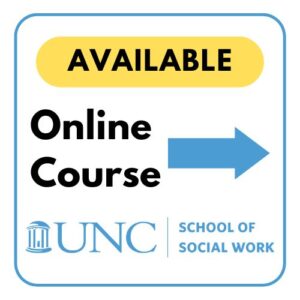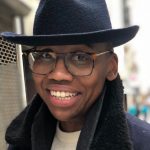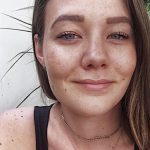Format: Self-paced / asynchronous program
Engage with this recorded program on your schedule.
 CE: 2 CEs total, read for more information on CEs
CE: 2 CEs total, read for more information on CEs
Fee: $35, read for more information on fees and scholarships
Description:
The workshop will focus on the use of narrative and relational healing practices for communities impacted by racial wounds and the need to target micro, mezzo, and macro-level systems for meaningful change. Panelists will explore how bodies both physically and emotionally respond to intergenerational trauma and considerations needed for healing. Anna Morgan-Mullane will speak to specific narratives of trauma responsive practices for individuals and family-based practice. Joshua Ware will provide an extensive overview of how to dismantle anti-Blackness within social work training, supervision, and individual practice model, drawing on attachment-based therapies and anti-racist supervision practices. Mackenzie Mullen will discuss the overarching gaps in social work education, namely in the core curriculum and internship experiences, and Johnell Lawrence will address practices to dismantle anti-Blackness within organizational mental health-based settings.
Objectives:
By the conclusion of this program, participants will be able to:
- Name and apply at least 3 clinical tools specific to healing racial wounds with the clients they serve.
- Identify and describe at least 1 individual therapeutic and 1 clinical supervisory practice designed through a framework of somatic abolitionism.
- Identify at least 2 gaps in current social work curriculum and training with at least 3 new models, authors, and researchers presently identifying the need for a deeper level of unpacking white-body supremacy in social work practice
Panelists:
 Johnell Lawrence is an equity consultant, lecturer, advocate, and educator. Currently. Johnell works at the NYC Department of Health serving as the Deputy Director of Clinical Operation for the COVD-19 response as well as Health Equity Manager in HIV programming. Their focus and expertise is in addressing racist systems of oppression both in work and community spaces by addressing inequitable processes that reinforce harm caused through health and mental health disparities. Their work focuses on facilitating groups and conversations around the impacts of racism and all forms of oppression in organizations and communities. Their work centers healing and collaboration amongst all stakeholders while building bridges towards reimagining all systems as a whole.
Johnell Lawrence is an equity consultant, lecturer, advocate, and educator. Currently. Johnell works at the NYC Department of Health serving as the Deputy Director of Clinical Operation for the COVD-19 response as well as Health Equity Manager in HIV programming. Their focus and expertise is in addressing racist systems of oppression both in work and community spaces by addressing inequitable processes that reinforce harm caused through health and mental health disparities. Their work focuses on facilitating groups and conversations around the impacts of racism and all forms of oppression in organizations and communities. Their work centers healing and collaboration amongst all stakeholders while building bridges towards reimagining all systems as a whole.
 Anna Morgan-Mullane, DSW, LCSW-R in an adjunct faculty member of the NYU Silver School of Social Work, where she teaches a course she developed on the intersectionality of criminal injustice reform and mental health implications for those impacted by mass incarceration. Her research focuses on the intergenerational effects of incarceration, the unique experiences by children of incarcerated parents within national and international settings. She presents on her research widely, including at the National NASW conference and at the Global Prison Conference in South Africa. She also conducts a training program for MSW interns, social workers, psychiatrists, and art therapists on anti-racist and critical culturally responsive therapeutic skills needed to support children impacted by parental incarceration. In 2012, she established the first outpatient mental health clinic in the United States specifically designed to address the needs of children and adolescents impacted by parental incarceration. She has also developed clinical policies and practice guidelines and launched an evidence-based treatment model that includes trauma-focused CBT, narrative therapy, complex trauma systems theory, and mitigation practices. She successfully established the first Article 31 mental health clinic in the United States for children of incarcerated parents at CPNYC and served as Vice President of Mental Health Services at Children of Promise, NYC for 12 years.
Anna Morgan-Mullane, DSW, LCSW-R in an adjunct faculty member of the NYU Silver School of Social Work, where she teaches a course she developed on the intersectionality of criminal injustice reform and mental health implications for those impacted by mass incarceration. Her research focuses on the intergenerational effects of incarceration, the unique experiences by children of incarcerated parents within national and international settings. She presents on her research widely, including at the National NASW conference and at the Global Prison Conference in South Africa. She also conducts a training program for MSW interns, social workers, psychiatrists, and art therapists on anti-racist and critical culturally responsive therapeutic skills needed to support children impacted by parental incarceration. In 2012, she established the first outpatient mental health clinic in the United States specifically designed to address the needs of children and adolescents impacted by parental incarceration. She has also developed clinical policies and practice guidelines and launched an evidence-based treatment model that includes trauma-focused CBT, narrative therapy, complex trauma systems theory, and mitigation practices. She successfully established the first Article 31 mental health clinic in the United States for children of incarcerated parents at CPNYC and served as Vice President of Mental Health Services at Children of Promise, NYC for 12 years.
Mackenzie Mullen, is an MSW Candidate at New York University and currently serves individuals impacted by trauma and substance use as a clinical social worker at the Brien Center. She uses a collaborative and person-centered approach to address stressors and advocate for community resources and individual healing. At NYU, she has been trained and supported in the implementation of culturally responsive somatic programs that are peer lead. Her primary interest centers on reforming and abolitioning the psychiatric industrial complex and ending mass incarceration. Her training and most current research focuses on healing-centered approaches for social work students that also actively dismantle white-body supremacy. Previously, she worked in school-based settings with children and families impacted by complex trauma, where she applied abolition practices to dismantle systemic racism and violence in institutional care for adolescents.
 Joshua Ware, LCSW is a clinical social worker for Mental Health Services Corp at SUNY Downstate’s Family Health clinic and a specialist in anti-oppressive clinical practice for several non-profits and academic institutes throughout New York City. Mr. Ware’s expertise and curricula focus on dismantling the stigma of mental health care within the Black/Caribbean community to foster healing and self-love. Mr. Ware’s work primarily involves psychotherapy with adults who would not be able to afford therapy otherwise. He also collaborates and develops policy work within mezzo and macro practice around undoing the system of mass incarceration. Mr. Ware has created the curriculum for a college courses at Sing Sing Correctional Facility; he also co-created the Mass Incarceration Conversation Series (MICS) at the New York University Silver School of Social Work. Mr. Ware has presented his work and guest lectured around dismantling anti-blackness in social work with Children of Promise, NYC at the NASWNYC Conference, as well as at the National Conference in Washington, DC.
Joshua Ware, LCSW is a clinical social worker for Mental Health Services Corp at SUNY Downstate’s Family Health clinic and a specialist in anti-oppressive clinical practice for several non-profits and academic institutes throughout New York City. Mr. Ware’s expertise and curricula focus on dismantling the stigma of mental health care within the Black/Caribbean community to foster healing and self-love. Mr. Ware’s work primarily involves psychotherapy with adults who would not be able to afford therapy otherwise. He also collaborates and develops policy work within mezzo and macro practice around undoing the system of mass incarceration. Mr. Ware has created the curriculum for a college courses at Sing Sing Correctional Facility; he also co-created the Mass Incarceration Conversation Series (MICS) at the New York University Silver School of Social Work. Mr. Ware has presented his work and guest lectured around dismantling anti-blackness in social work with Children of Promise, NYC at the NASWNYC Conference, as well as at the National Conference in Washington, DC.
References:
- Kirkinis, K., Pieterse, A. L., Martin, C., Agiliga, A., & Brownell, A. (2018;2021;). Racism, racial discrimination, and trauma: A systematic review of the social science literature. Ethnicity & Health, 26(3), 1-21. https://doi.org/10.1080/13557858.2018.1514453
- Menakem, R. (2017). My grandmother’s hands: Racialized trauma and the pathway to mending our hearts and bodies. Central Recovery Press.
- Metzger, I. W., Anderson, R. E., Are, F., & Ritchwood, T. (2021). Healing interpersonal and racial trauma: Integrating racial socialization into trauma-focused cognitive behavioral therapy for African American youth. Child Maltreatment, 26(1), 17-27. https://doi.org/10.1177/1077559520921457
- Morgan-Mullane, A., & Morgan-Mullane, A. (2018). Trauma focused cognitive behavioral therapy with children of incarcerated parents. Clinical Social Work Journal, 46(3), 200-209. https://doi.org/10.1007/s10615-017-0642-5
- Morgan-Mullane, A.COVID-19 and the injustice system: Reshaping clinical practice for children and families impacted by hyper-incarceration. Shared Trauma, Shared Resilience during a Pandemic, 291-301. https://doi.org/10.1007/978-3-030-61442-3_30
- Palacios, L. (2016). Challenging convictions: Indigenous and black race-radical feminists theorizing the carceral state and abolitionist praxis in the united states and canada. Meridians, 15(1), 137-165. https://doi.org/10.2979/meridians.15.1.08
- Waite, R., & Nardi, D. (2021). Understanding racism as a historical trauma that remains today: Implications for the nursing profession. Creative Nursing, 27(1), 19. https://doi.org/10.1891/CRNR-D-20-00067
